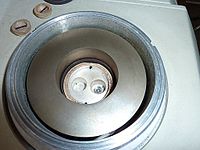Differential scanning calorimetry

Okay kiddo, have you ever played with a cake before it gets cooked? You might have noticed that the batter feels very different from the finished cake, right? That's because the cake batter changes as it gets cooked – it gets hotter, and the ingredients start to react with each other.
Scientists use a similar concept to study chemicals and materials. They use a tool called a differential scanning calorimeter, or DSC for short. Think of it like a magic oven that can measure how things change when they get heated up.
Basically, the DSC works by heating up a little bit of a material and then measuring how much heat it absorbs as it changes. It records how temperature changes affect the energy of a substance, which can tell scientists a lot about what that substance is made of and how it behaves in different conditions.
For example, let's say that scientists want to know how a sample of plastic reacts to heat. They would put a tiny piece of it into the DSC and heat it up gradually, while measuring how much heat the plastic absorbs. The DSC would show a graph with a big peak when the plastic starts to change, then a smaller one when the change finishes.
By analyzing that graph, scientists can learn all sorts of things about how the plastic behaves. They can find out at what temperature it starts to melt, how much energy it takes to melt it, and how it behaves while it's melting.
So, in summary, differential scanning calorimetry is a tool that helps scientists figure out how materials react to being heated up. They use it to learn all sorts of cool things about how materials are made and how they behave.
Scientists use a similar concept to study chemicals and materials. They use a tool called a differential scanning calorimeter, or DSC for short. Think of it like a magic oven that can measure how things change when they get heated up.
Basically, the DSC works by heating up a little bit of a material and then measuring how much heat it absorbs as it changes. It records how temperature changes affect the energy of a substance, which can tell scientists a lot about what that substance is made of and how it behaves in different conditions.
For example, let's say that scientists want to know how a sample of plastic reacts to heat. They would put a tiny piece of it into the DSC and heat it up gradually, while measuring how much heat the plastic absorbs. The DSC would show a graph with a big peak when the plastic starts to change, then a smaller one when the change finishes.
By analyzing that graph, scientists can learn all sorts of things about how the plastic behaves. They can find out at what temperature it starts to melt, how much energy it takes to melt it, and how it behaves while it's melting.
So, in summary, differential scanning calorimetry is a tool that helps scientists figure out how materials react to being heated up. They use it to learn all sorts of cool things about how materials are made and how they behave.
Related topics others have asked about:
